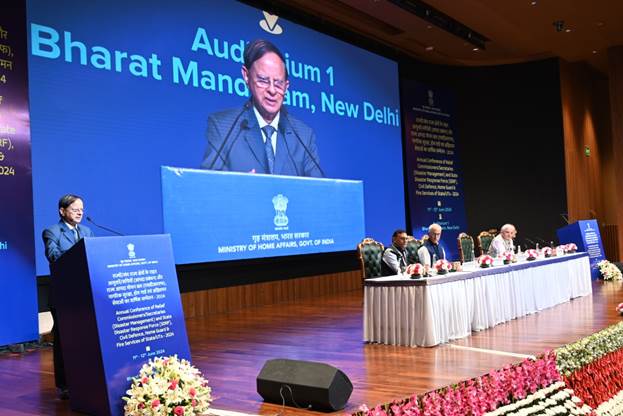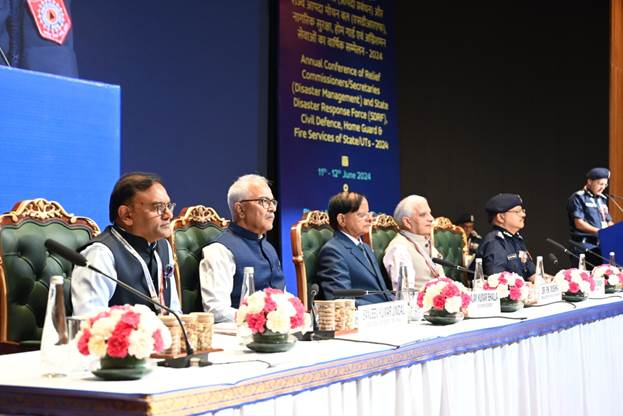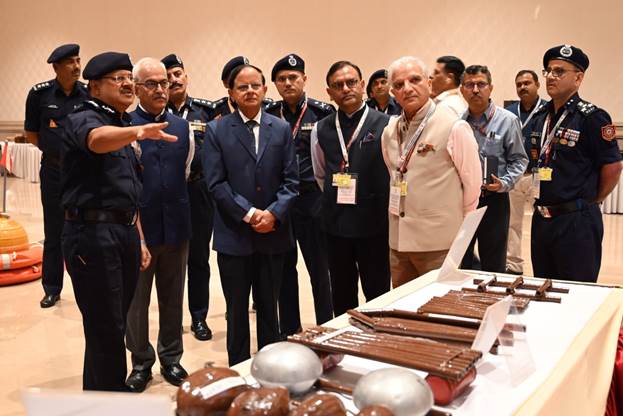The two day annual conference of relief commissioners/secretaries (Disaster Management) and State Disaster Response Force (SDRF), Civil Defence, Home Guard & Fire Services of State/UTs-2024 concluded in New Delhi today. Principal Secretary to the Prime Minister of India, Dr. P. K. Mishra chaired the valedictory session. Union Home Secretary, Sh. Ajay Kumar Bhalla, also attended the session along with other senior officers from the Ministry of Home Affairs.

Speaking on the occasion, Dr. P K Mishra said that India has demonstrated its ability to respond and reach out to other countries when disasters have struck. Our international collaborative efforts like Coalition for Disaster Resilient Infrastructure (CDRI) and the new G20 Working Group on Disaster risk management have been lauded all over the world. He said that while we can take pride in achievements in area of disaster management in and around the world, we cannot remain satisfied and need to have a clear vision for the future. Dr. P K Mishra highlighted six mantras to be focused in the days to come which will strengthen our position in a long run;
- Disaster management should reach the local level, each city, town, village and hamlet, up to the family level should have the basic awareness, capacity and resources to deal with disasters.
- A calendar of mitigation measures should be prepared to avoid repetitive and seasonal problems. Implementing basic vulnerability reduction measures like de-silting of drains etc. and better solid waste disposal in cities could help tide up urban flooding problems.
- Focus of disaster management is now shifting from response to resilience. There is a need to plan for the future with mitigation and resilience as its pillars. India has institutional mechanism in the form of disaster mitigation fund. Much of the infrastructure of the Viksit Bharat is yet to be built. In next few years there is going to be lot of expansion in infrastructure. All future infrastructures must have resilience inbuilt in their architecture at the blueprint stage itself.
- Use of technology, robotics, artificial intelligence, big data etc. to be leveraged in the fields of early warning system, common alert protocols, periodical monitoring of lakes through satellite, state of the art equipment for rescue and relief etc. He expressed belief that technology is going to be used more and more in future.
- Prepare for black swan events that can cause large scale disruptions of economies, societies and well being for eg. COVID 19. There is a need to learn from such events and ensure that the learning is not forgotten.
- Disasters cannot be managed by the single agency, or department, or ministry on its own. It requires whole of the government, whole of the society approach. We need to broaden our efforts to include not only disaster management agencies but other stakeholder agencies too. The Silkyara tunnel rescue was a testament of coming together of all agencies across the government which pooled their resources and expertise to ensure the rescue of the trapped labourers. States will have to develop capacity to assist not only themselves and their own people but also the adjoining districts of other states.

The two-day conference was attended by more than 300 delegates from State Governments / UTs, Ministries/Departments/Organizations of Central Government and from SDRFs/Fire Services in the States/UTs.
During the two-day conference, various sessions were organized and the experts dwelled upon the subjects like Early Warning, Post Disaster Loss Assessment, Roles of Disaster Response Forces, Coastal Hazards, satellite based early warning on tsunami, storm surge and cyclones etc.
The Ministry of Home Affairs (MHA) organizes the Annual Conference of Relief Commissioners of States/ UTs before the onset of monsoon season, to review their preparedness for dealing with any natural disaster, which may occur during the monsoon period. Simultaneously, NDRF organizes capacity building conference for State Disaster Response Forces (SDRFs), Civil Defence, Home Guard & Fire Services of States/ UTs for the preparedness of response forces.

With a view to bring synergy in response efforts, as well as to take Relief Commissioners/ Revenue Secretaries on board for strengthening of SDRF; this year MHA organised a combined conference.
Issues ranging from preparedness on South West Monson as well as how to look into managing emerging risks of Glacial Lake Outburst Flood (GLOF), Forest Fire & CBRN were discussed in the conference.
 Matribhumi Samachar English
Matribhumi Samachar English


